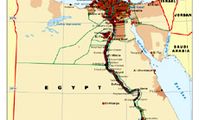Key Regulatory Changes

The World's Top Reformer
EGYPT HAS TAKEN bold steps during the past tour years to slash red tape and make one of the world's oldest economies also one of the easiest in which to do business. These measures have included tax cuts, customs cuts, reform of the customs bureaucracy, streamlined procedures for foreign and domestic investors and, of course, the creation of the nation's first Ministry of Investment.
Created in July 2004, the Ministry of Investment has a mandate to promote the private sector's role in the economy. As part of the transformation, the Ministry has turned the General Authority for Investment and Free Zones (GAIT) from a regulatory institution into a proactive investment promotion agency. On the other front, the Ministry has also launched fast-track dispute-resolution services for all investors.
The regulatory and institutional frameworks governing investment in Egypt have changed significantly in the past three years. Key objectives of the process were to enhance transparency, protect property rights and entrench the principle of non-discrimination as the core principles of investment policy in Egypt. Today, GAFI's much-lauded One-Stop Shops have made starting a business significantly easier. The One Stop Shops are home to staff fromevery agency that an investor needs to visit in order to open a new business, obtain permits and receive regulatory approvals. From the Tax Authority to Customs, everyone is here, cutting the time it takes to establish a business to anywhere from 14-140 days to just three days.
At the nation's Customs Authority, reforms in the second hall of 2004 slashed customs — and cut the number of tariff categories to six from 27 while reducing the number of articles covered under the Customs Act by more than half. Overnight, those changes eliminated trade distortions.
On the taxation front the government eliminated tax holidays and exemptions in favor of a streamlined tax law introduced in 2005. The new tax code slashed corporate and personal income tax rates — which had previously ranged from 32-40% — to a uniform 20%. (The exception to the rule is the oil and gas sector, where the old rate of 40.55% still applies.)
Tax cuts have allowed investors to operate on a level playing field, reducing confusion, moving to a random-sample audit procedure and almost completely eliminating bureaucratic subjectivity in tax assessments. (Exceptions still apply in free
zones.) Today, the Ministry of Finance is working with parliamentarians to lay the groundwork for the next round of tax reforms, which will streamline the nation's sales tax and real estate tax regimes.
Meanwhile, the new Unified Labor Law of 2003 gave investors new flexibility with regard to the hiring and lay-off of workers, while the new competition law (passed in January 2004 and promulgated in June 2005) has created a world-class anti-monopoly and fair competition agency, the Egyptian Competition Authority. The government has also taken steps to safeguard the economic rights of citizens through the new Consumer Protection Agency.
The impact of these measures has been sharp. Domestic investment is soaring, and inflows of foreign direct investment have skyrocketed from a mere USS 407 million in 2003/04 to USS 11 billion in 2006/07 and USS 7.8 billion in the first half of 2007/08.
Your Rating:
Overall rating: 0.000
Totally voted: 0
Comments
Weather in:
Exchange Rates
-
IMF loan expected next month
Apr 22, 2013, rating: 3.000, 3 votes Egypt may secure an International Monetary Fund loan agreement in about amonth, state news agency MENA reported, quoting "informed" sources ...
Egypt may secure an International Monetary Fund loan agreement in about amonth, state news agency MENA reported, quoting "informed" sources ...
-
Egypt population to hit 84 million next month.
Feb 28, 2013, rating: 5.000, 1 votes Egypt's population is expected to reach 84 million on 1 March, or aburgeoning 92 million when Egyptians living abroad ...
Egypt's population is expected to reach 84 million on 1 March, or aburgeoning 92 million when Egyptians living abroad ...
-
Country's diesel reserve only enough for three days.
Feb 05, 2013, rating: 5.000, 1 votes Egypt’s strategic reserve of diesel fuel used for trucks and grouptransport vehicles can meet demand only for three days ...
Egypt’s strategic reserve of diesel fuel used for trucks and grouptransport vehicles can meet demand only for three days ...
-
Egypt received 11 million tourists in 2012 and aims to boost that number to 14 million in 2013.
Jan 22, 2013, rating: 3.000, 2 votes
Egypt received 11 million tourists in 2012 and aims to boost that number to 14 million in 2013.
-
Egypt limits travelers leaving country to US$10,000 in cash
Dec 26, 2012, rating: 3.250, 4 votes Egypt has banned travelers from carrying more than US$10,000 in foreigncurrency cash in or out of the country ...
Egypt has banned travelers from carrying more than US$10,000 in foreigncurrency cash in or out of the country ...
-
National Coalition on Climate Change for Egypt is born
Nov 30, 2012, rating: 5.000, 1 votes The global COP18 conference on climate change opens in Doha Monday.About 17,000 participants from all over the world ...
The global COP18 conference on climate change opens in Doha Monday.About 17,000 participants from all over the world ...








